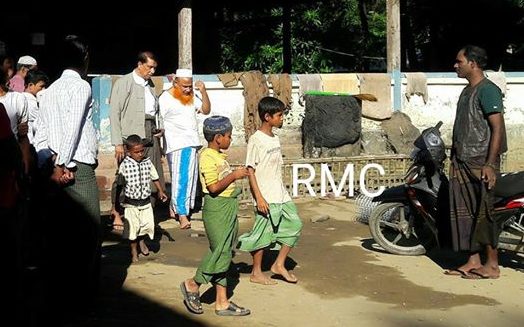RANGOON – Members of the Kofi Annan-led Arakan State Advisory Commission are visiting Buddhist and Muslim community leaders in the troubled state in an effort to reconcile conflict between the two communities.
Seven commission members arrived in the state capital Sittwe on Tuesday morning and met with the state government, Buddhist Arakanese civil society organizations and Muslim religious leaders, according to commission member Dr. Thar Hla Shwe.
“We explained the duties and responsibilities of the commission [and] asked suggestions from locals,” he said.
Former UN Secretary General Kofi Annan—who is head of the commission—did not join the trip but an online statement read: “I wish to express my deep concern over the recent violence in northern Rakhine [Arakan] State, which is plunging the State into renewed instability and creating new displacement.”
The region has erupted into fresh violence after attacks on police border guard posts early last month prompted a military security operation which has seen over 70 killed, according to government reports.
Al Haj U Aye Lwin of the commission said that initial observations suggested that there was a will within both communities to achieve peacefulness in the state, as without it all had learned that economic development could not take off.
Buddhist community representatives expressed support for the government’s National Verification Card (NVC) project to issue identification documents to the stateless Muslim in line with Burma’s 1982 citizenship law, providing them with greater freedom of movement, he said.
The commission also consulted on the on-going conflict in Maungdaw Township. Minority Buddhist communities in the township expressed concern for their safety and said that the Burma Army lockdown in the area had affected the freedom of both communities, said U Aye Lwin.
He added that the Muslim community he met with in Sittwe disapproved of the “violent attacks by extremists in Maungdaw.”
Muslim religious and community leaders also stressed the need to protect women and children during Burma Army operations and for stateless Rohingya to be given official government citizenship, rather than separate NVC documentation which marks them as outsiders.
Many Muslims in Arakan State possess National Registration (or “tri-fold”) Cards that once entitled them to equal rights with other Burmese citizens, including running for elected office.
However, the 1982 Citizenship Law narrowed eligibility for full citizenship along racial lines and replaced the “tri-fold’ with a white card, green card, and now the NVC, for “naturalized” and “associate” citizenship. Over three generations the issue of citizenship in the state has not been resolved.
U Aye Lwin remarked that he had met five Buddhist Arakanese youths who valued religious and racial diversity and sought a harmonious society.
“Arakanese youth are struggling to stay away from the past,” he said. “They do not talk much about the region’s long history and have no hatred.”
The Irrawaddy tried in vain to contact Daw Saw Khin Tint who is one of the Buddhist Arakanese representatives in the Kofi Annan Commission.

















